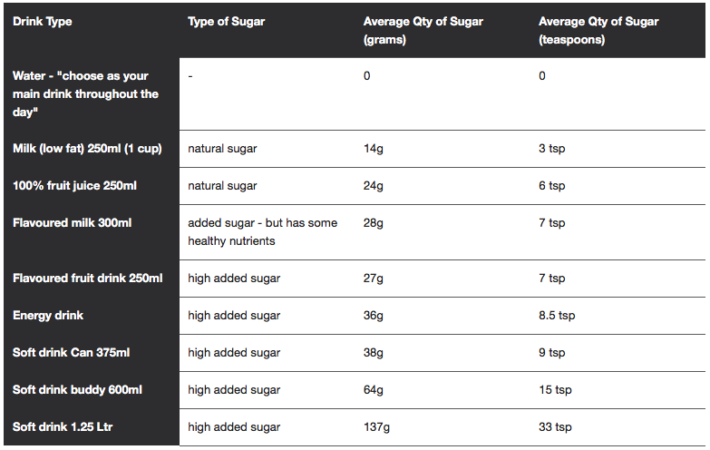Did you know the maximum daily recommended intake of sugar for an adult is 13 teaspoons? When laid out like this, it seems a lot. Most of us only add sugar over our cereal, or have it in tea and coffee. So no problems, right?
Wrong.
- One serving of breakfast cereal can have over 5 teaspoons sugar
- The average can of soft drink contains about 10 teaspoons sugar
- A muesli bar has a whopping 7 teaspoons sugar
- 1 cup tomato sauce can have as much as 6 teaspoons sugar
And this is before even considering the things we know to be sweet, like chocolate, lollies or dessert.
Sugar is so much more than those white granules we add to cakes or use to sweeten our drinks. It comes in many shapes and forms, making it hard to really know what we’re feeding ourselves and our families. What makes it even harder is that some sugar is naturally occurring, such as that in fruit and vegetables, and is much healthier than that found in processed foods.
The below table is from the Department of Health, and shows how much sugar there is in different types of drinks, as well as if the sugars are added or naturally occurring.

How much sugar is in my drink?
From this, it’s clear water should be our main drink throughout the day. Milk is also a good choice, as it contains only natural sugars and has other helpful ingredients like calcium. Milk also helps to neutralise acid levels.
Fruit juice and flavoured milks are sometimes drinks. They contain healthy nutrients but are fairly high in sugar.
The remainder of the drinks, including sports drinks, soft drink and energy drinks, should be consumed only very occasionally, if at all.
You can reduce your intake of sugar by reading the food labels and checking the quantity of sugar per 100g. A good guide is to aim for less than 15g sugar per 100g.
If you have too much sugar, your saliva can no longer control the acidity, causing holes in teeth that need to be filled. If left too long, the tooth might need root canal treatment or to be removed.
However, reducing your sugar intake doesn’t only help prevent tooth decay. It is of course essential to your general health and wellbeing and helps reduce the risk of diabetes and obesity.
For more information, check out Sugar Free Smiles.
